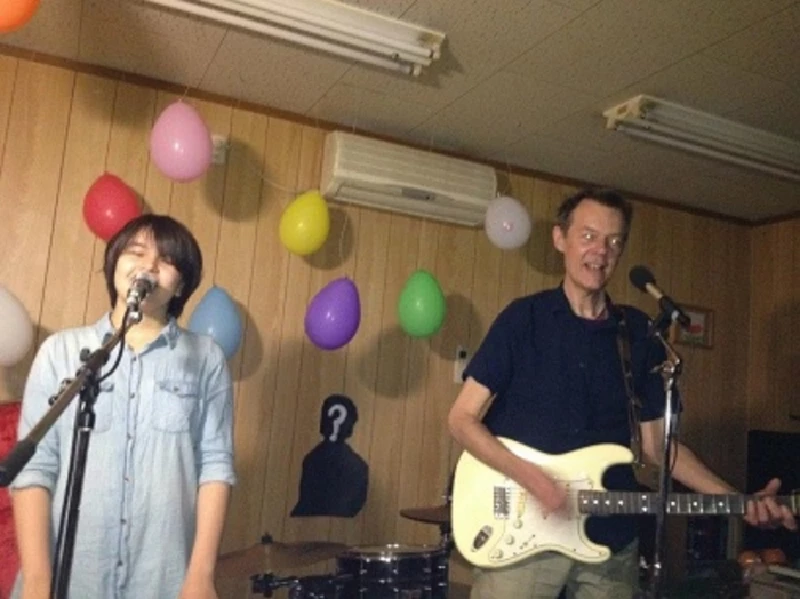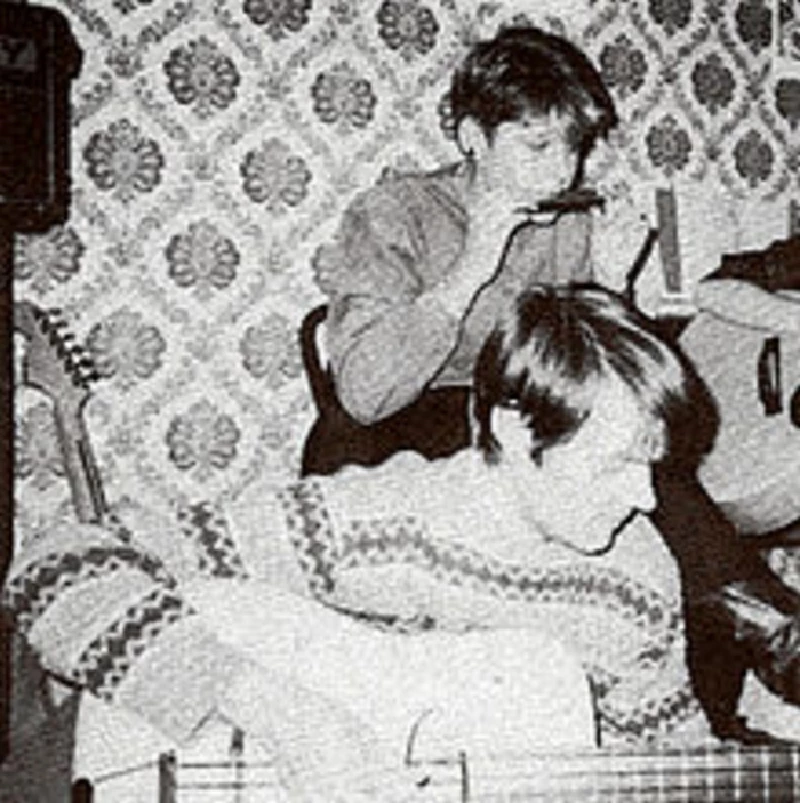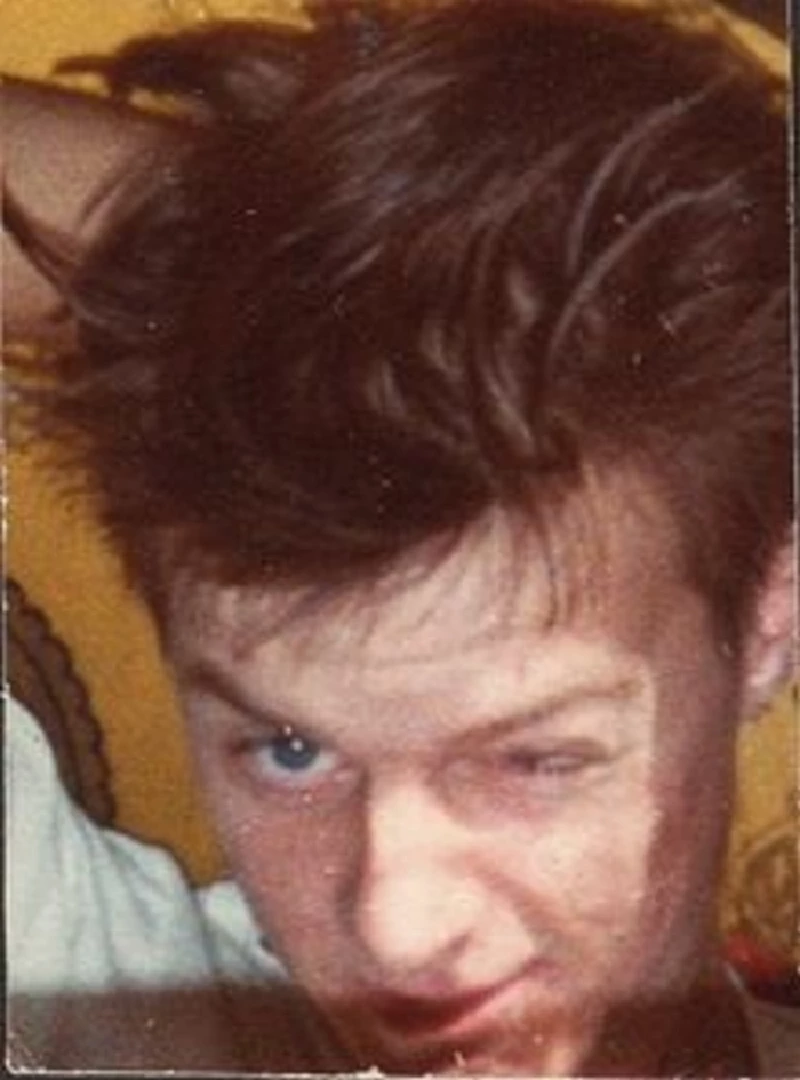Trixie's Big Red Motorbike - Interview
by Anthony Strutt
published: 29 / 10 / 2012

intro
Anthony Strutt speaks to Mark Litten from Isle of Wight-formed and now Japanese-based early 80's indie pop act Trixie's Big Red Motorbike about his band's recent reformation
Trixie’s Big Red Motorbike were an indie pop group that were formed on the Isle of Wight by brother and sister Mark and Melanie Litten. The group, as well as Melanie (vocals, recorder) and Mark (songwriter, guitar, bass, drum machine), also consisted of Jim Bycroft (sax, keyboard) and latterly Jane Fox (backing vocals), who would go on to join the Marine Girls. Trixie’s Big Red Motorbike only recorded a handful of records, and just two singles, a flexidisc and an EP in their original lifetime, each in a lo-fi, twee pop style and very limited qualities. They have all, however, gone on to become highly sought after collector’s items. The group, which split up in 1985, reformed earlier this year in a new line-up that features Mark and his fifteen year old daughter, Jane Litten (songwriter, vocals, keyboard, recorder, percussion). They released in February a compilation, ‘All Day Long in a Bliss’, which features everything that they have released to date, and also have a new album planned for early next year. They have also recently toured the world for which they raised the funding to do so through PledgeMusic. Pennyblackmusic spoke to Mark Litten about Trixie’s Big Red Motorbike’s reformation. PB: Where did the name Trixie’s Big Red Motorbike come from? ML: One of my favourite bands back then was the Rezillos. That name popped into my head one night and I think it was inspired by the imagery in their songs. But it doesn't mean anything except Trixie's Big Red Motorbike. PB: How did you all meet? ML: Well, I met my sister the day she was born! Jim Bycroft, who sometimes played keyboards and sax with us, was a work colleague. We first met Jane Fox when she came down for a summer holiday on the Isle of Wight. I met my daughter in the hospital on the night she was born. PB: Do you know how collectable your releases are? ML: Yes. I can't afford them unfortunately. And I have never seen the first single. ‘Invisible Boy’, which came out in 1983, for sale anywhere. I've got just one copy of that. We did a hundred copies of the first single, a thousand of our next release, the ‘5 Songs’ EP, which came out in 1983, and two thousand of our next single ‘Norman and Narcissus’, which also came out in 1983. There was also an Isle of Wight compilation album, ‘Feet on the Street’ for which we recorded two tracks in 1984, and a 7” flexidisc, ‘That’s the End of That’, which came out at about the same time, but I'm not sure how many of those that they pressed. PB: How rock ‘n’ roll is the Isle of Wight? ML: Well, there's the Isle of Wight Festival itself, the Bestival and Level 42 and the Bees. But still not much interesting new music I think. I live in Japan now, so I'm not sure. There's really only one band from there worth listening to, I believe. PB: Have you ever toured and how have you found the dates you recently played? ML: We never toured back in the eighties. There was no money for that, and Melanie and I were both incredibly shy. I'm a bit more cocky now though, and Jane loves to be on stage, so we are playing as often as we can. It's one of the things I like to do most. We've done both acoustic and electric shows this year, and I think the best was in Hamburg in September. PB: How did ‘All Day Long in Bliss’ come about? ML: About a year ago I realised that the Trixie's archive was a complete mess. Loads of illegal and horrible-sounding MP3s drifting about, any vinyl you could find was way too expensive, and nobody knew anything much about what we did back in the eighties. So I gathered up all I could find and put it all together in one place. ‘All Day Long in Bliss’ started as a download-only album, but then I was able to do a CD with a nice booklet. I love it. The sound is much better than I thought it would be, and it feels like a satisfying end to Trixie's first phase. Although I would like to release the covers and BBC stuff we did too someday. PB: And why did you decide to use PledgeMusic for your recent tour? ML: PledgeMusic is good, I think. It's a way for bands to raise money for a new album, tour etc. It's not holding out the begging bowl; anyone who chips in gets something of appropriate value back. We funded the first bit of our summer tour with help from our fans, and they got some exclusive goodies. Save The Children got a bit of cash too. I recommend it to any poor artist with a decent amount of fans. PB: Did you do any Peel Sessions. If so do you have any fond memories of Peel? ML: We did two Peel sessions, in 1982 and 1983. He was the first DJ to play our records, but he could never say our name right on the air. PB: How would you describe your sound and would you say it has changed much in your history? ML: Well, it's always melodic but it's not always easy on the ear because we are a bit slap-dash with our playing and recording. The basic Trixie approach hasn't changed much. We kind of ride around in one huge circle, stopping off for a bite of acoustic here, some noisy guitars there, taking a little side road to where the drum machines live, then back to our recorder and tambourine hideout. The album we are working on now will probably have an "acoustic" side, and an "electric" side, seven songs on each. It should be fun. PB: What are your future plans? ML: The album should be out early next year. Then we want to play as often and as widely as we can... PB: Thank you.
Picture Gallery:-


most viewed articles
current edition
Carl Ewens - David Bowie 1964 to 1982 On Track: Every Album, Every SongArmory Show - Interview with Richard Jobson
Colin Blunstone - Thalia Hall, Chicago, 16/7/2025
John McKay - Interview
Billie Eilish - O2 Arena, London, 10/7/2025
Bathers - Photoscapes 1
Visor Fest - Valencia, Spain, 26/9/2025...27/9/2025
Loft - Interview
Robert Forster - Interview
Sir Tim Rice - Interview
previous editions
Manic Street Preachers - (Gig of a Lifetime) Millennium Stadium, Cardiff, December 1999Heavenly - P.U.N.K. Girl EP
Beautiful South - Ten Songs That Made Me Love...
Oasis - Oasis, Earl's Court, London, 1995
Peter Perrett - In Dreams Begin Responsibilities Interview Part One
Boomtown Rats - Ten Songs That Made Me Love....
Prolapse - Interview
Coldplay - Wembley Arena. London, 16/8/2022
Trudie Myerscough-Harris - Interview
Pixies - Ten Songs That Made Me Love...
most viewed reviews
current edition
Davey Woodward - Mumbo in the JumboSick Man of Europe - The Sick Man of Europe
Lucy Spraggan - Other Sides of the Moon
Amy Macdonald - Is This What You've Been Waiting For?
Phew, Erika Kobayashi,, Dieter Moebius - Radium Girls
Bush - I Beat Loneliness
Suzanne Vega - Flying With Angels
Alice Cooper - The Revenge of Alice Cooper
Cynthia Erivo - I Forgive You
Blueboy - 2
Pennyblackmusic Regular Contributors
Adrian Janes
Amanda J. Window
Andrew Twambley
Anthony Dhanendran
Benjamin Howarth
Cila Warncke
Daniel Cressey
Darren Aston
Dastardly
Dave Goodwin
Denzil Watson
Dominic B. Simpson
Eoghan Lyng
Fiona Hutchings
Harry Sherriff
Helen Tipping
Jamie Rowland
John Clarkson
Julie Cruickshank
Kimberly Bright
Lisa Torem
Maarten Schiethart